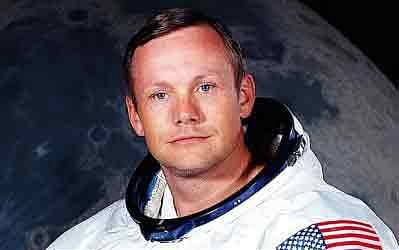Remembering Neil Armstrong

Neil Armstrong
It has been about a month since the passing of Neil Armstrong, the first man to set foot on the moon. He was 82. A public memorial service for him was held on September 13 at the Washington National Cathedral in the American capital. Armstrong, who was a navy pilot in his youth, was buried at sea.
All accounts of Armstrong's life suggest he was a modest and private man. After his mission, he worked briefly in an administrative capacity for Nasa. In 1971, he became a professor in aeronautical engineering at the University of Cincinnati. He had two passions in life: piloting airplanes and engineering. He had done much of the former, first as a test pilot and then as a Nasa astronaut. Now he could indulge in the latter.
For nearly a decade he taught at the university and remained completely unassuming, normal even. He refused corporate sponsorships, offers to sit on the boards of multinationals, honorary doctorates and millions of dollars to write his memoirs. He rarely granted interviews or spoke to the press. He did, from time to give public talks, but only if the occasion had some greater value: a commemoration of some great aviation event or educational functions involving young students. In the rare moments when he publicly spoke, he was eloquent, modest, funny, and self-deprecating.
I did not know Neil Armstrong personally but our paths did cross and for that I feel grateful. The first time was in late 1969, a few months after his flight to the moon. As part of Nasa's efforts to publicise the accomplishments of the Apollo programme the three Apollo astronauts were sent off on a goodwill tour of 24 cities across the world. On October 25, 1969, the crew arrived in Dhaka. My father took his three-year-old son with him and braved the crowds at Airport Road to catch a glimpse of the crew. It is one of my earliest memories. We are standing by the side of the road when a convertible car slowly drives by with the three men and their wives waving. I did not understand why these men were so important, but my father's enthusiasm was infectious, and I smiled and laughed with him.
My second interaction with Neil Armstrong remains the most meaningful to me. A few years before, I had written a book, subsequently published by Nasa on the history of the Russian space programme. My childhood memory prompted me to decide to send a copy of the book to Neil Armstrong. He was not easy to track down. A deeply private person, he closely guarded his personal life. But I was able to obtain a post office box address in Ohio. I wrote Armstrong a short letter and with it enclosed a copy of my book. In my letter, I mentioned my fading memory of his brief visit to Dhaka.
It goes without saying that I expected to hear nothing in return. But exactly a week later, I received an e-mail from "N. A. Armstrong." It was short and to the point:
Dear Professor Siddiqi,
Thank you for your letter and copy of your recent text, Challenge to Apollo: The Soviet Union and the Space Race, 1945-1974.
It is a heavy text and, therefore, not so likely to be carried on airplane trips where I most often have the chance to read something of my choice. I hope to have a bit of free time over the holidays and look forward to seeing the product of your serious efforts.
I do remember my visit to Dacca in what was then known, if I remember correctly, as East Pakistan. Seldom , if ever, have I seen such enthusiasm on the part of the crowds watching the motorcade you remembered.
You were most thoughtful to share your work with me and I send my very best wishes for continued success.
Sincerely,
Neil Armstrong
There was something earnest about his words. He didn't have to write back but he did. Perhaps he was as considerate and thoughtful as some people said he was. I was amazed (and pleased) that he remembered anything at all about that whirlwind trip to Dhaka.
My last contact with Armstrong came in 2009 during celebrations for the 40th anniversary of the first moon landing. I went to a symposium attended by him. During an intermission, I went up to the former astronaut and introduced myself as the author of a book that he owned. He was gracious but brief. I am not by nature someone who gets excited being in the vicinity of famous people but there was something extraordinary about his presence.
There is no need to idealise Armstrong -- undoubtedly, like all people he had his shortcomings. His biographer, James Hansen, noted that Armstrong could be distant, stubborn even. Some say that the first man on the moon could have been a much more active campaigner for raising funds for space exploration. Regardless, he did possess admirable qualities worth emulating: keen intelligence, curiosity and fearlessness about the unknown, and a deep humility.
When he died on August 25 , Armstrong's family released a brief statement about his illness and passing. The concluding words of that obituary encapsulate both the wonder and the irreverence which characterised the late astronaut. It concluded: "For those who may ask what they can do to honour Neil, we have a simple request. Honour his example of service, accomplishment and modesty, and the next time you walk outside on a clear night and see the moon smiling at you, think of Neil Armstrong and give him a wink."
I cannot think of a more fitting epitaph for the man.

 For all latest news, follow The Daily Star's Google News channel.
For all latest news, follow The Daily Star's Google News channel. 



Comments